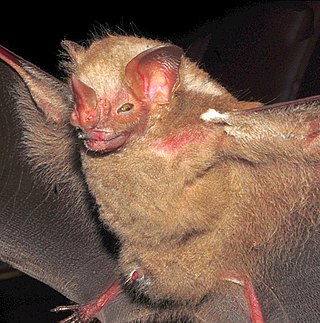Top Qs
Timeline
Chat
Perspective
Ipanema bat
Species of bat From Wikipedia, the free encyclopedia
Remove ads
The Ipanema bat (Pygoderma bilabiatum) is a bat species of order Chiroptera and family Phyllostomidae. It is found in northern Argentina, Bolivia, southeastern Brazil and Paraguay.[1] It is the only species within its genus.[2]
Remove ads
Description
Summarize
Perspective
The Ipanema bat is a medium-sized bat which is brown-furred overall, with the exception of its white-furred shoulders.[3] The fur of its back is a darker shade of brown than that of its chest.[3] It has less fur on its shoulders and upper chest than on the rest of its body, particularly in males.[3][4] Its rostrum is shorter and more square-shaped than other species of its subfamily, Stenodermatinae[3][5] It has a large nose and no tail, with roundish ears having a small, 4–5 mm (0.16–0.20 in) tragus.[3]
Size varies based on sex and geographical location. Females tend to be larger than males.[5][6][4] The skulls of Ipanema bats from Argentina and Bolivia are bigger than those of their counterparts in Paraguay and Brazil.[6] P. bilabiatum typically has two molars.[3][7] However, some females have a third molar (usually in the mandibular jaw) not seen in males.[3][7] This may be correlated with the larger jaw size of females.[7]
While both males and females have glands below the jaw and surrounding the eyes, the glands in males are generally larger.[4] Males also have forelimb swellings, which are not seen in females.[5] The size and presence of such swellings varies geographically.[5] Additionally, forelimb swellings appear to be correlated with development of the males' eye glands.[5] Due to the dimorphism of forelimb swellings, It is thought that they could be correlated with mating behaviors.[5]
Remove ads
Range and habitat
The Ipanema bat resides in northern Argentina, southeastern Brazil, Paraguay, and Bolivia.[8][6] Their preferred habitats are tropical forests, subtropical forests, and secondary forests.[9] Although atypical, they are sometimes found in the coastal shrublands of Brazil.[9] This suggests that perhaps P. bilabiatum can expand its habitat into dryer, more sparsely vegetated areas.[9]
Biology
P. bilabiatum is frugivorous, specializing in fruit that is easily digested.[4] These fruits are usually very ripe and fleshy, with few seeds.[4] The fruit choices of the Ipanema bat are diverse, including the fruits of Lucuma caimito, Miconia brasiliensis, and trees of the genus Celtis, as well as Maclura tinctoria, Solanum granuloso-leprosum, and Ficus enormis.[3][4][10][11] Some may also feed on nectar.[4]
P. bilabiatum usually reproduces in either the fall or the winter.[4] It is thought that they give birth during the later end of the dry period and wean their young at the beginning of the wet period.[11] This strategy coordinates birth with the highest amount of fruit attainability.[11] Females only carry one fetus at a time.[4]
Behavior
Migration patterns may be influenced by rainfall amount and/or temperature. P. biliabatum appears to prefer regions with a minimum annual rainfall of 1,500 mm (59 in) and moderate temperatures of 16–23 °C (61–73 °F)[8] Food availability and foraging capabilities seem to be an important factor in the timing and distance traveled during migration[8] Females and males migrate differently.[8] Males tend to linger in lower elevations, while females reside at intermediate and high elevations.[8]
Remove ads
References
Wikiwand - on
Seamless Wikipedia browsing. On steroids.
Remove ads



